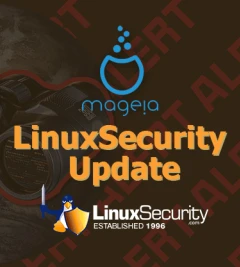Mageia 2025-0035: libreoffice Security Advisory Updates


Path traversal leading to arbitrary .ttf file write. (CVE-2024-12425) URL fetching can be used to exfiltrate arbitrary INI file values and environment variables. (CVE-2024-12426) References:


Path traversal leading to arbitrary .ttf file write. (CVE-2024-12425) URL fetching can be used to exfiltrate arbitrary INI file values and environment variables. (CVE-2024-12426) References:


xmlXIncludeAddNode in xinclude.c in libxml2 before 2.11.0 has a use-after-free. (CVE-2022-49043) References: - https://bugs.mageia.org/show_bug.cgi?id=33975


Redis' Lua library commands may lead to remote code execution. (CVE-2024-46981) Redis allows denial-of-service due to malformed ACL selectors. (CVE-2024-51741)


Vanilla upstream kernel version 6.6.74 fixes bugs and vulnerabilities. For information about the vulnerabilities see the links. References: - https://bugs.mageia.org/show_bug.cgi?id=33968


ClamAV OLE2 File Format Decryption Denial of Service Vulnerability. (CVE-2025-20128) References: - https://bugs.mageia.org/show_bug.cgi?id=33969


Upstream kernel version 6.6.74 fixes bugs and vulnerabilities. The kmod-virtualbox and kmod-xtables-addons packages have been updated to work with this new kernel. For information about the vulnerabilities see the links.


Object corruption in V8. (CVE-2025-0611) Out of bounds memory access in V8. (CVE-2025-0612) References: - https://bugs.mageia.org/show_bug.cgi?id=33962


Git LFS permits exfiltration of credentials via crafted HTTP URLs. (CVE-2024-53263) References: - https://bugs.mageia.org/show_bug.cgi?id=33931


Vulnerability in the Oracle VM VirtualBox product of Oracle Virtualization (component: Core). Supported versions that are affected are Prior to 7.0.24 and prior to 7.1.6. Easily exploitable vulnerability allows high privileged attacker with logon to the infrastructure where Oracle VM VirtualBox executes to compromise Oracle VM VirtualBox. While


When the assert() function in the GNU C Library versions 2.13 to 2.40 fails, it does not allocate enough space for the assertion failure message string and size information, which may lead to a buffer overflow if the message string size aligns to page size. (CVE-2025-0395)


Timing side-channel in ECDSA signature computation. (CVE-2024-13176) References: - https://bugs.mageia.org/show_bug.cgi?id=33942 - https://openssl-library.org/news/secadv/20250120.txt


It was discovered that iperf 3.17.1 contains a segmentation violation via the iperf_exchange_parameters() function. References: - https://bugs.mageia.org/show_bug.cgi?id=33914


fix possible security issue with library code slim/psr7 (CVE-2023-30536) fix possible security issue relating to iconv (CVE-2024-2961, PMASA-2025-3) fix an XSS vulnerability in the check tables feature (PMASA-2025-1) fix an XSS vulnerability in the Insert tab (PMASA-2025-2)


libpoppler.so has an out-of-bounds read vulnerability within the JBIG2Bitmap::combine function in JBIG2Stream.cc. (CVE-2024-56378) References: - https://bugs.mageia.org/show_bug.cgi?id=33932


net/http: sensitive headers incorrectly sent after cross-domain redirect, (CVE-2024-45336). crypto/x509: usage of IPv6 zone IDs can bypass URI name constraints, (CVE-2024-45341).


Lot of CVEs were fixed by upstream since our current version; please see the links. References: - https://bugs.mageia.org/show_bug.cgi?id=33609


Heap buffer overflow in rsync due to improper checksum length handling. (CVE-2024-12084) Info leak via uninitialized stack contents. (CVE-2024-12085) Rsync server leaks arbitrary client files. (CVE-2024-12086) Path traversal vulnerability in rsync. (CVE-2024-12087)


In the Raptor RDF Syntax Library there is an integer underflow when normalizing a URI with the turtle parser in raptor_uri_normalize_path(). References: - https://bugs.mageia.org/show_bug.cgi?id=33929


An improper array index validation vulnerability exists in the nowindow functionality of OFFIS. A specially crafted DICOM file can lead to an out-of-bounds write. An attacker can provide a malicious file to trigger this vulnerability, CVE-2024-47796. An improper array index validation vulnerability exists in the


Git does not sanitize URLs when asking for credentials interactively. (CVE-2024-50349) Newline confusion in credential helpers can lead to credential exfiltration in git. (CVE-2024-52006)